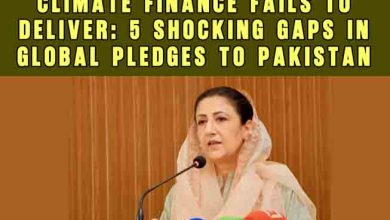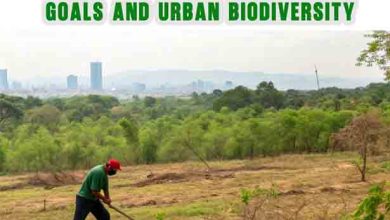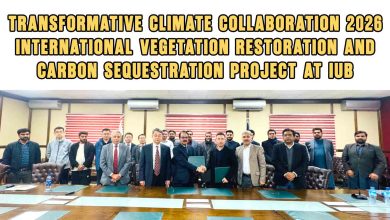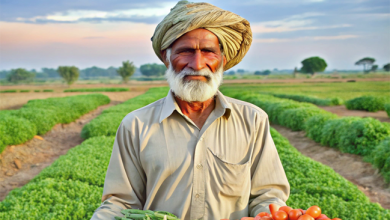#UAE’s agricultural drive: Lesson for #Pakistan
By Hammad Gillani
His Excellency Dr. Sheikh Sultan bin Mohammed Al Qasimi, Member of the Supreme Council and Ruler of Sharjah, launched the first phase of a 400-hectare wheat farm in the Maliha region of the United Arab Emirates in November 2022. The farm aims to enhance food security and reduce dependence on imported wheat by utilizing seawater desalination for irrigation and advanced technology like artificial intelligence and thermal imaging for data collection. The farm is expected to expand to 1,400 hectares by 2025 and eventually to 1,900 hectares, with energy costs declining as the project scales up. In December 2022, the UAE’s Minister of Climate Change and Environment, Maryam Al-Maheri, urged government agencies to buy local agricultural products to boost the development of agriculture in the desert nation. She also stated that the UAE, which imports 90 percent of its food, will continue to prioritize trade openness while supporting domestic production through technology. While some countries like the #UAE are taking steps to ensure food security despite not being agricultural nations and seeking global expertise, they are also exploring new possibilities like growing crops in challenging regions like the Sahara desert. In contrast, countries like Pakistan, which has the world’s largest irrigation system, struggle to meet their domestic crop needs for essential commodities such as #wheat and other #agricultural products.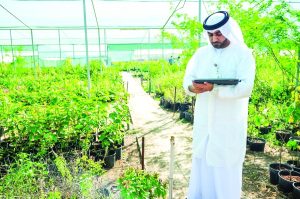
#Pakistan is a major agricultural country, with the world’s largest irrigation system used to cultivate crops such as wheat, rice, sugarcane and cotton. Punjab is the most important agricultural province, known for growing wheat and cotton, while Sindh and Punjab have mango orchards, making Pakistan the fourth largest mango producer globally. Pakistan is also a significant producer of various crops, including sugarcane, maize, potatoes and fruits such as oranges and apples. Agriculture is a vital sector of Pakistan’s economy, with wheat, sugarcane, cotton and rice accounting for over 75% of the total cost of crop production. Although the economic importance of agriculture has declined since independence, the sector still plays a critical role in the country’s economy. Pakistan is the largest camel market in Asia and the second largest apricot and ghee market globally. #Agricultural reforms, such as increasing wheat and basil production, are part of the government’s economic reform package and most of Pakistan’s agricultural production is used by its growing processed food industry.
Pakistan’s farmers are encountering numerous economic, natural, socio-economic and financial challenges. While Pakistan has a total area of approximately 79.6 million hectares, only 23.7 million hectares are utilized for agriculture and approximately 88 million hectares remain unused. The subdivision of land and difficulties with land acquisition prevent the application of modern agricultural technology. Salinity and water scarcity are twin issues affecting the agricultural sector. The appearance of salt deposits on the ground surface is impacting the performance of the sector, with waterways and salinity causing a loss of approximately 0.10 million acres of land annually. Inadequate rural infrastructure, including roads, storage facilities, transport, electricity, education, sanitation and healthcare, is another hindrance to agriculture development. Farm-to-market roads are insufficient and in poor condition. Due to population growth and land distribution under inheritance law, landowners are repeatedly subdividing their land, resulting in many farmers having less than 2 hectares of land, making it difficult to use modern machinery. While agricultural mechanization is on the rise in Pakistan, old equipment is still used in most areas for agricultural production.
Farmers in Pakistan have faced many challenges, including a lack of support from the government, outdated agricultural techniques and poor land reform policies. Although there were some improvements during Imran Khan’s government, farmers continue to struggle to receive fair payment for their crops. The agricultural education system in Pakistan is inadequate, with only 16 universities and colleges dedicated to agriculture. Compared to developed countries, Pakistan’s average crop production is low and continuous research is needed to improve agricultural growth. Land reforms are urgently needed to address the problem of poor land systems and low yields. #Crop rotation and pest control are also crucial for restoring soil fertility and maintaining productivity. Climate conditions and natural factors also have a significant impact on agricultural growth in Pakistan. Additionally, illiteracy among farmers makes it difficult for them to keep proper records of their income and expenses and a significant portion of their income is spent on social events and festivals.
The agricultural sector in Pakistan faces numerous challenges, including the joint family system, which contributes to reduced savings and investment by farmers. Illiteracy, lack of training and poor health also hinder productivity. Political instability has further affected development in the sector, as unrest discourages investment and farmers struggle to sell their produce as raw material to industries. Additionally, inadequate access to agricultural credit facilities, volatile commodity prices and unreliable non-regulatory sources of loans contribute to farmers’ financial difficulties. To address these challenges, there is a need to prioritize the provision of agricultural credit, investment in water and dam construction, agricultural research, development of agro-based industries, tax incentives and training programs for farmers. By improving these factors, the agricultural sector can thrive and farmers can achieve greater prosperity.
—The writer is contributing columnist.
Email: engineerhammad786@gmail.com



